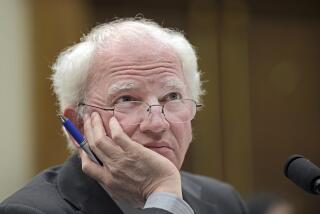Cheney is said to have halted promotion
- Share via
WASHINGTON — Vice President Dick Cheney blocked the promotion of a Justice Department official who had raised questions about the legality of a secret administration surveillance plan during an unusual standoff with the White House in 2004, Senate investigators were told Wednesday.
The objections raised by the former official, Patrick Philbin, helped persuade the Bush administration to make changes in the National Security Agency program, but not before Philbin was denied a promotion by Cheney, former Deputy Atty. Gen. James B. Comey said in written answers to questions from the Senate Judiciary Committee.
Philbin was part of a team of Justice Department officials under Comey who conducted a legal analysis of the program beginning in late 2003. Questions about the program reached a head in March 2004, when then-Atty. Gen. John Ashcroft was hospitalized with a gallbladder disorder and Comey temporarily assumed power. Comey refused to reauthorize the program, and along with FBI Director Robert S. Mueller III threatened to resign.
Philbin was under consideration for the No. 2 position in the Office of the Solicitor General, the arm of the Justice Department that represents the government before the Supreme Court.
Comey previously said that Philbin had been denied a promotion because of his role in the surveillance dispute.
He said in the written testimony that it was Cheney who led the opposition, and that the vice president had made his views known to Atty. Gen. Alberto R. Gonzales, who apparently did not pursue the promotion.
“I understood that someone at the White House communicated to Attorney General Gonzales that the vice president would oppose the appointment if the attorney general pursued the matter,” Comey wrote. “The attorney general chose not to pursue it.”
Philbin, who like Comey left the Justice Department, declined to comment in an e-mail message.
Comey wrote that he and Philbin had discussed their concerns about the program during a March 9, 2004, meeting at the White House with a group including Cheney and others.
The Bush administration launched the warrantless electronic surveillance program after the Sept. 11 attacks.
Under pressure from Congress and the courts, the White House later agreed to subject the program to judicial review.
The written comments follow a public account Comey gave last month of a late-night encounter between Justice and White House officials at the hospital bedside of Ashcroft a day after he had undergone major surgery.
Gonzales and White House Chief of Staff Andrew H. Card Jr. had gone to the hospital in the hope of getting Ashcroft to approve the surveillance program. Ashcroft also declined to approve the program.
Bush later agreed to make the changes that the Justice Department officials desired, but only after Comey and the others had threatened to resign.
Comey revealed in the written remarks that the classified program continued without legal certification from the Justice Department for “approximately several weeks.”
--
More to Read
Sign up for Essential California
The most important California stories and recommendations in your inbox every morning.
You may occasionally receive promotional content from the Los Angeles Times.












